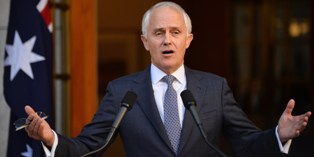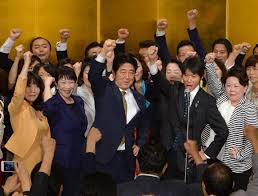 huffingtonpost.com.au
huffingtonpost.com.au With a change in prime minister, one might suspect that this would also result in a shift in Australia’s foreign policy position vis-à-vis a number of relations in the region and further afield. There certainly were a large number of newspaper articles that came out just have the leadership change, pointing to Turnbull’s past comments in relation to China and how this new prime minister would not be as “tough” in regards to China’s strategic territorial ambitions as his predecessor. Yet one interview conducted by the ABC on Tuesday soon removed all doubt as to where Turnbull stood on the issue of the South China Sea – firmly in the camp populated by US President Barack Obama, Japanese PM Shinzo Abe, and every other leader in nations surrounding the disputed area.
So the belief that Turnbull would somehow be “soft” on China as a result of his past links to the country, and the revelation that his son is married to the daughter of a (former) Chinese Community Party linked academic (as though this in itself is justification for questions about Turnbull’s commitment to pre-existing relations) has proven a little pre-emptory. Certainly Turnbull recognises the economic opportunities that Asia presents, and China’s role in that regionally driven boom is obvious to anyone who has paid any attention to it over the past 10 years or more. Yet Turnbull is not blind to the risks presented by China’s actions in the East and South China Seas, and so articulated this concern during his interview with Leigh Sales.
Throughout the last two weeks, media commentators have been writing themselves into a frenzy over what the Turnbull government should and should not do in relation to foreign affairs, and so I thought there might be some value in condensing these views down into something more manageable so that one might not have to spend days trolling through them all. One particularly interesting point that came up was the fact that Julie Bishop is still Foreign Minister. Also, it was Bishop’s influence and her decision to eventually back Turnbull that brought many doubters on the right over to Turnbull’s camp. Hence it is unlikely that Turnbull will try to dominate Australian foreign policy from the Prime Minister’s Office as some prime ministers have attempted to do in the past.
There is clearly value in Turnbull reassuring Japan that it has a solidly dependable partner in the South Pacific. Since Abe and Abbott were so close, the sudden removal of Abbott introduced a unknown factor into the growing strategic relationship between Australia and Japan. Since Tuesday, Turnbull’s comments (coupled with those of new Defence Minister Marise Payne and US Ambassador John Berry) would have given Japan plenty of reason to believe that the relationship will continue as per usual, which is damn reassuring for a country that needs regional partners to offset the influence of China. Turnbull and Abe have already spoken, hence one can imagine that there was a re-commitment to continuing the already strong relationship between both countries.
The change in leaders has both up and down sides for those involved, but obviously it is ruinous for continuity. Michael Fullilove was correct in pointing out that this constant churn of leaders is playing havoc with Australian foreign policy. No sooner do we have a government establish a policy when all of a sudden we have a new prime minister and have to re-calibrate the entire scope of Australia’s foreign policy so that it conforms with the prime minister’s thinking. It’s a distraction that Australia doesn’t need, it makes other countries look askance at what Australia’s behaviour and wonder what the hell we are doing, and if Australia is to make an impact on global events it needs a stable political system.
Back to the question of Turnbull’s stance on Japan. The public record for Turnbull on his attitude towards Japan is overwhelmingly positive, indeed he has on occasion referred to Japan as an ‘ally’ of Australia and praised its people for their stoicism. While it is true that Turnbull has drawn reference to China’s role in the defeat of Japan in WWII and declared that this should be recognised, he was drawing reference to an event that occurred more than 70 years ago and circumstances today are vastly different. Not only this, it is highly likely that Turnbull, upon being exposed to the intelligence apparatus in Canberra, will develop a more conservative bent in his foreign policy thinking, supporting the shoring up of alliances and new strategic partnerships rather than exploring the hazardous route of neutrality. If it happened to Julia Gillard, then it can certainly happen to Turnbull.
One other point that I found interesting about the commentary on Turnbull during the week was Malcolm Jorgensen of the Lowy Institute. Jorgensen pointed out that whereas Tony Abbott was fond of seeing Australia’s relations with other nations in terms of heritage and shared traditions (the Anglo-sphere ideal), Turnbull’s philosophy is broader than that. In Turnbull’s view, it is not heritage that binds people together, it is shared values, values which transcend cultural and ethnic barriers. That will serve him in much better stead that Abbott’s thinking, for the idea of universal values inspires confidence and anticipation far more than the more exclusionist rhetoric of heritage and tradition.
It is early days in the Turnbull administration, and we do not yet know where this government has in store for our bilateral and multilateral relations. But with an erudite leader backed by capable ministers, the future certainly looks promising. However we as Australians must make it plainly clear to all involved in the political process: no more leadership changes. Stick with what you’ve got, ride it out to the next election, and then make some adjustments. The nation will thank you in the long term.

 RSS Feed
RSS Feed